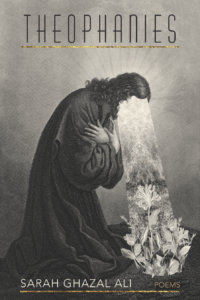 Review by Janet McCann
Review by Janet McCann
Theophany is an encounter with a deity that manifests in an observable and tangible form. These encounters are described in many religious texts and are part of the spiritual life. In this work, glimpses into the spiritual dimension define a distinctive angle of vision.
Sarah Ghazal Ali is the author of Theophanies, which was selected as the Editors’ Choice for the 2022 Alice James Award. A Djanikian Scholar, Stadler Fellow, a 2022-23 Stadler Fellow at Bucknell University, and winner of the 2022 Sewanee Review Poetry Prize, she has published in Poetry, American Poetry Review, The Yale Review, and elsewhere. She has recently joined the faculty at Macalester College as an Assistant Professor of English. She is the poetry editor for West Branch and has lived in California.
This compelling collection has a highly original and sustained voice. This is not a book to browse around in; the poems pull the reader from one to the next, providing a steady flow of image and thought. There are strands to the central content–religion, the feminine, and the individual soul, the self. The poems give an overwhelming impression of a reflective and refractive female self, the nature of the feminine displayed and explored, human and divine. Within the feminine, there is a fusion of earth and spirit. Creativity is a female force. The work focuses on the mother, the birthing, the child. The Christian and Muslim women give birth to miracles and suffer the pain and torn-ness that come with birth. Other images of women’s pain surface, sometimes of violence, especially when recounting the murders of women, but it all becomes part of the flow.
There are a lot of circles and orbs in in the poem, lots of birthing and births, water and blood. As the reader, I had the urge to dip into a poem, and bring up an image or a metaphor to examine it. But images pass quickly. They come in on each other and comment on each other. It is hard to find anything like a passage that will illustrate this work, because the poems are so connected and the current of the flow is so strong. But a single poem may illustrate—I have chosen “Mother of Nations,” a pantoum, one of her favored Eastern forms and also one of mine.
. . . I pretend
not to hear Sarah’s bewildered laugh.
How does a barren tomb sound? Waiting
until she wasn’t. I pretend to be honeycomb
sucked clean, scraped raw.. . . (63)
How physical this Sarah is. Indeed, Women from the Quran and the Bible people the pages. Hagar/Hajar, Sarah/Sarai, Mary/ Maryam, Sarah/Sarai and of course Sarah the poet. Religions talk to each other and intermingle. Major religious figures take form and act. The patterns of the poems also provide unity. There are ghazals, pantoums, and I suspect other forms I cannot identify, as well as experimental forms that are unique and appropriately fitted to their content.
The variable woman who inhabits these poems is the creator, who gives birth to miracles, and the eternal sufferer, whose unending sacrifice allows the process to go on.
There is a brief glossary at the end to provide some sources for the poems’ references/sources, but the meaning sometimes remain mysterious, as she is searching, suggesting rather than stating, and therefore allowing the imagination to provide the associations.
I haven’t read a book of poems that so fully explores the relationship between soul and body and brings them so close together they appear aspects of the same thing. This is a new voice on the poetry scene, and one that we will be hearing a lot more of .
Theophanies: Poems by Sarah Ghazal Ali .
Alice James Books, 2024. 91 pp.
$24.95. ISBN# 978-1-949944-58-7.
Journals publishing Janet McCann’s work include Kansas Quarterly, Parnassus, Nimrod, Sou’wester, America, Christian Century, Christianity And Literature, New York Quarterly, Tendril, and others. A 1989 NEA Creative Writing Fellowship winner, she taught at Texas A & M University from 1969-2016, is now Professor Emerita. Most recent poetry collection: Life List (Wipf & Stock, 2021).
